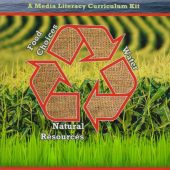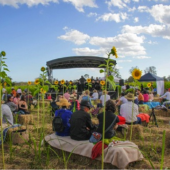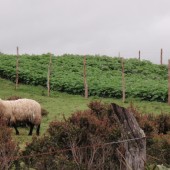
This article explores how teachers can integrate the theory and practice of media literacy education into the teaching of sustainability content. It highlights two lessons, one for elementary students on bottled water choices and one for high school students on climate change and agriculture, detailing lesson construction and execution. The article explains how praxis, the intersection of reflection and action, can be brought to life in classroom settings using contemporary media documents as codes to deepen understanding and to initiate involvement for change.
Continue Reading
Held near Siena, Italy, our 3-week summer abroad program, The Mindful Palette of Stonehill College, combines art, gastronomy, and agricultural studies that strive for cultural mindfulness through holistic and experiential learning processes. A strong belief in sustainability, both philosophically and praxis, underlie these unique experiences. We share the complexities of attaining a sense of mindfulness with modern expectations and preconceptions. We address strategies to convince and support students to not only taste-test but to learn and embrace another culture and the environment through interdisciplinary activities and media formats. Through immersive and hands-on learning, we explore the intersections of food culture and the arts, so that students gain a comprehensive understanding of the impact of the handmade and the value of personal labor. A nose-to-tail mindset defines how and what materials we use. Until the modern era, art-making, food preparation, and scientific experiments were born out of the kitchen, both as laboratory and studio. The hearth was also the heart of the home—and therefore defined the family and cultural identity. Artistic practices that begin with the origins of our resources and have connections to the kitchen fortify our lessons and touch upon many of the aspects we find most important in the act of mindful learning—awareness of the self and the other, and our material’s origins and potential uses. They result in seeing how the daily and divine are one and the same.
Continue Reading
Abstract: Solutions to environmentally damaging human practices require cooperation between many different communities. This article explores sustainability-focused education through the lens of a current work-in-progress, Sugar vs the Reef?, which involves collaboration between sugarcane farmers and artists in the arable catchment of the Great Barrier Reef in North Queensland. This is a socially engaged art project that is addressing the fraught relationship between the region’s agriculture and the fragile ecology of the Reef. We introduce some of the specific aspects of socially engaged art (SEA) which commend it as a cross-disciplinary method for bridging diverse individuals and organisations – in particular, the notion of a “holding environment” for complex socio-ecological situations. We consider how this approach might broaden the agricultural practice of “extension” which aims to transform farming through educational outreach. Ideas emerging from contemporary socially engaged art practice may contribute to a toolkit for researchers and practitioners within and beyond the academy who are searching for ways to overcome the limitations of current methodologies and movements for social change.
Continue Reading
In this interesting comparison of sustainability in very different geographic and cultural settings—Long Island, New York versus the Chiloé archipelago, Chile—Vercoe and Brinkmann suggest that the societal framework for sustainability requires very different educational efforts. Their in-depth analysis of how these societal frameworks are almost diametrically opposed opens us to understanding how important geography is to the way we formulate our educational goals and systems.
Continue Reading